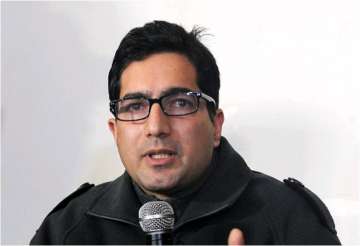In an apparent display of duality on the issue of abrogation of Article 370, IAS officer-turned-politician Shah Faesal had claimed two weeks ago that "you can either be a stooge or a separatist now", but a week later in his petition in the Supreme Court, Faesal came on record saying "the state of Jammu and Kashmir is an integral part of India."
Faesal and his associates are harping their views on Kashmir, maintaining a contradictory stand.
Faesal had tweeted that there would be no Eid festivities and that Kashmiris across the world were mourning the illegal annexation of their land.
"There shall be no Eid till everything that has been stolen and snatched since 1947 is returned back. No Eid till the last bit of insult is avenged and undone," he had tweeted.
However, his petition in the Supreme Court begins with the submission, "The petitioners (Faesal, Shehla Rashid and five others) herein are citizens of India and are recognised as permanent residents of the state of Jammu and Kashmir."
Faesal had resigned from the Indian Administrative Service (IAS) in January this year. Later, he launched his political outfit Jammu & Kashmir People's Movement.
Similarly, the National Conference (NC), a prominent political party in Kashmir, has vehemently echoed its protest against the abrogation of Article 370, but has adopted a conflicting stand in its petition in the Supreme Court.
"India, that is Bharat, is a union of states, bound together by a unique federal structure. This federal structure has evolved organically over the years, based on the needs, requirements and history of our nation," the NC said in its petition.
Interestingly, Faesal and the NC have not denied the existence of a formal association between Kashmir and India, saying that it was an integral part of the country.
Their petitions have a common query for the apex court -- how can the Centre unilaterally unravel this unique federal scheme (Article 370) under cover of President's Rule, while undermining crucial elements of due process and the rule of law.
Their petitions, apparently identical, claim that the government's decision on Kashmir was a frontal attack on the principles of 'federalism', 'democracy' and 'the rule of law', protected and guaranteed under the provisions of the Constitution of India.
The NC states in its petition that the constituent assembly of Jammu and Kashmir drafted a constitution for the state, specifically recognising that Jammu and Kashmir was an integral part of the Union of India. Therefore, both Faesal and the NC seem to be contradicting their stand on the abrogation of Article 370.
Also Read | Internet more useful to terrorists and Pak for mobilisation, indoctrination: Governor Satya Pal Malik
Watch | No shortage of medicines in Jammu and Kashmir: Satya Pal Malik
Latest India News
